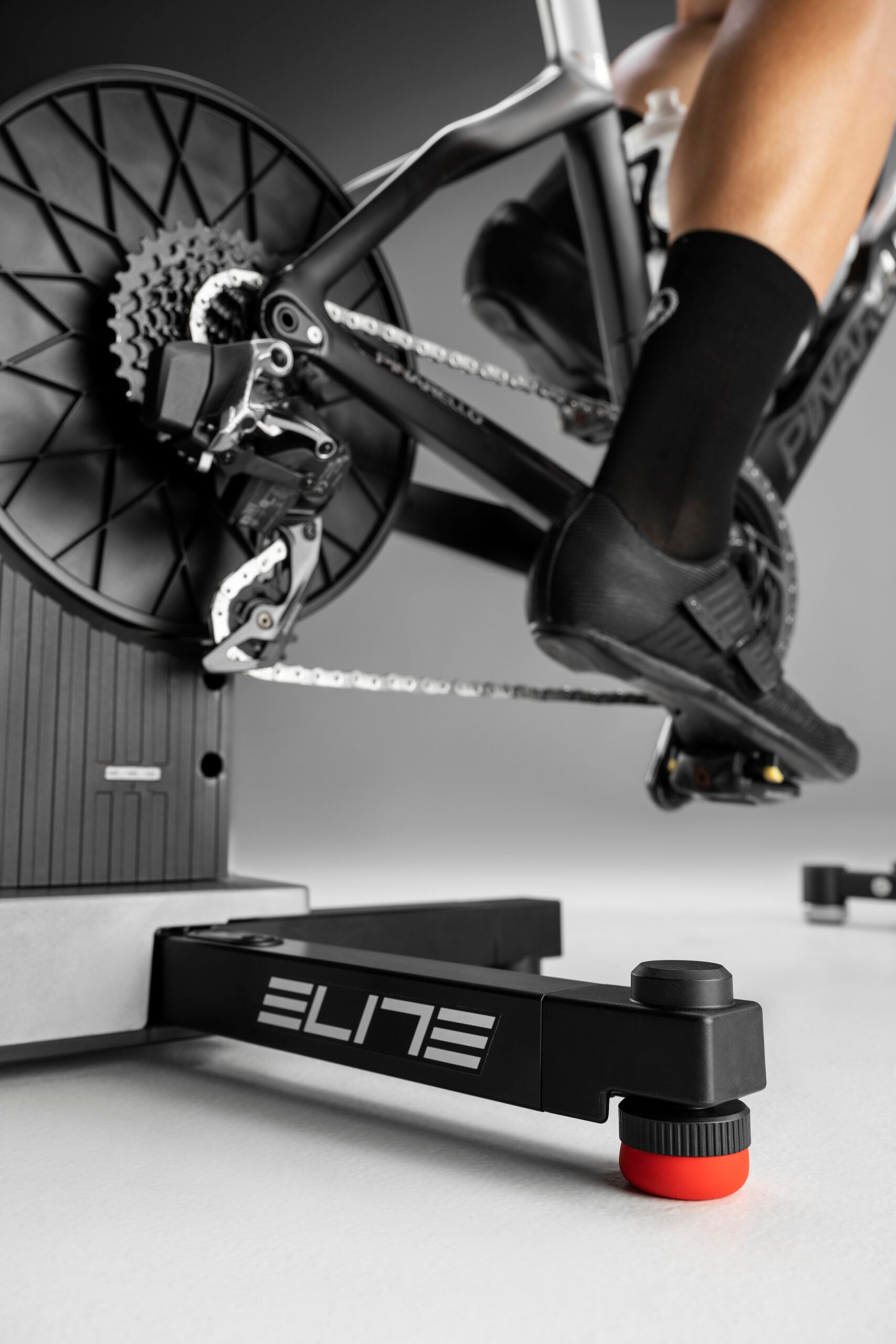New perk! Get after it with local recommendations just for you. Discover nearby events, routes out your door, and hidden gems when you sign up for the Local Running Drop.
Elite is a lesser-known smart trainer company in the USA, but that doesn’t mean their products are lacking. In fact, it’s just the opposite. The recently-released Elite Justo is heavy on the metrics, light on the sound, and rivals other industry-leading trainers.

RELATED: The Best Bike Trainers for Triathletes and Cyclists: Winter 2022
Section dividerElite Justo Specs
| Weight | 37.5 lbs. |
| Flywheel Weight | 13.7 lbs |
| Power Accuracy | +- 1% |
| Max Wattage | 2300 watts |
| Max Gradient Simulation | 24% |
| ANT+ and Bluetooth Compatible | Yes |
| Data Collected | Power, speed, cadence, pedaling efficiency |
Elite Justo: What We Like
The Justo is easy to like. One common theme across the smart trainer market this year is that manufacturers have clearly invested in making their products quieter. The Justo came in at about 70 db while riding at 250 watts. This is not the quietest trainer we’ve tested (the Zwift Hub takes that podium), but it is significantly quieter than other direct drive trainers of years past.
When it comes to connectivity, the Justo offers standard ANT+ and/or Bluetooth capabilities. The Justo even has a hardwired Ethernet cable port if you want to be sure you have no data interruptions during your ride. The Justo also offers bridging technology if you exceed its two Bluetooth channels, which means you can use both an external heart rate monitor and cadence sensor (vs. the built-in cadence sensor of the Justo) and “bridge” those connections via FE-C ANT+ or FTMS Bluetooth protocols. Basically, you can leverage multiple external sensors without worrying about maxing out the two Bluetooth channels.
As for how well the Justo simulates the road, we’ll give it a solid passing grade. The flywheel on the Justo weighs about three pounds less than the KICKR’s, but still weighs enough to ground the trainer and bike and create that “real” feel. The Justo also has its proprietary “flex feet” that come standard with each trainer.
The flex feet are squishy but sturdy foam feet that noticeably, well, squish, as you ride, creating a more realistic outdoor sensation. This slight undulating from each side as you ride will also help your low back and hips from fatiguing as much during long indoor rides. The movement to each side was definitely noticeable and could be enough to replace a rocker plate, but might not quite be there just yet. If squishy feet aren’t your thing, you can swap them out for a less-mobile pair of feet that come with each trainer.

We also like that the Justo has what Elite calls “Standalone Mode.” This allows a rider to use the Justo even when it is not connected to an app such as Zwift or when an electrical outlet isn’t available. While it’s not nearly as fun to ride without connectivity, a rider can adjust the trainer’s resistance sans-electricity via the Elite app and use the Justo that way. Again, not nearly as fun, but now you never have a technology-related excuse not to get your trainer workout in.
This is pretty standard across the board these days, but the Justo is able to connect with nearly every virtual riding app out there: Zwift, Ful Gaz, Rouvy – take your pick.
Finally, we can appreciate that the Justo was created with sustainability in mind (although it was packed in styrofoam, so there’s definitely room for improvement), sourcing plastic components from “environmentally responsible processing” and leveraging a circular production model that limits Elite’s use of raw materials and tries to repurpose existing plastic.
Section dividerElite Justo: What’s Just OK
There isn’t a lot to dislike about the Justo. It’s a solid trainer that will turn heads once released in the States.
The biggest drawback is the Elite Justo does not come with a cassette and there is no option to purchase one with the trainer. While installing a cassette is a very easy bike skill to learn, it does require that you source your own cassette and the couple of tools needed to mount it. Not ideal, but not a crisis.
The Justo’s stability is not quite as comforting as a Wahoo Kickr, which consistently ranks high for stability. The Justo’s support legs sit at 180 degrees vs. the Kickr’s, which sit at much smaller angles, meaning that there is a lot of room for sideways sway while on the bike. This can be a good thing in the sense of the flex feet, but at times the bike felt slightly tippy, especially when digging in on a tough interval.
RELATED: The Smart Trainer Explainer
Section dividerElite Justo Extended Review: Conclusions
The Elite Justo is a trainer to watch. It rivals industry leaders like the Wahoo KICKR and is poised to quickly become a favorite of triathletes thanks to its spot-on metrics, creative connectivity, and ease of use from unboxing to first ride. The Justo is perfect for the data-heavy triathlete who wants a fairly realistic road feel and the ability to leverage multiple sensors during their rides.
It’s difficult to find much to critique about the Justo, but what sticks out the most is that there is no cassette included in the purchase. This is a minor detail, but one that some may find frustrating – and an added cost – when purchasing.
RELATED: 2022 Indoor Training for Triathletes